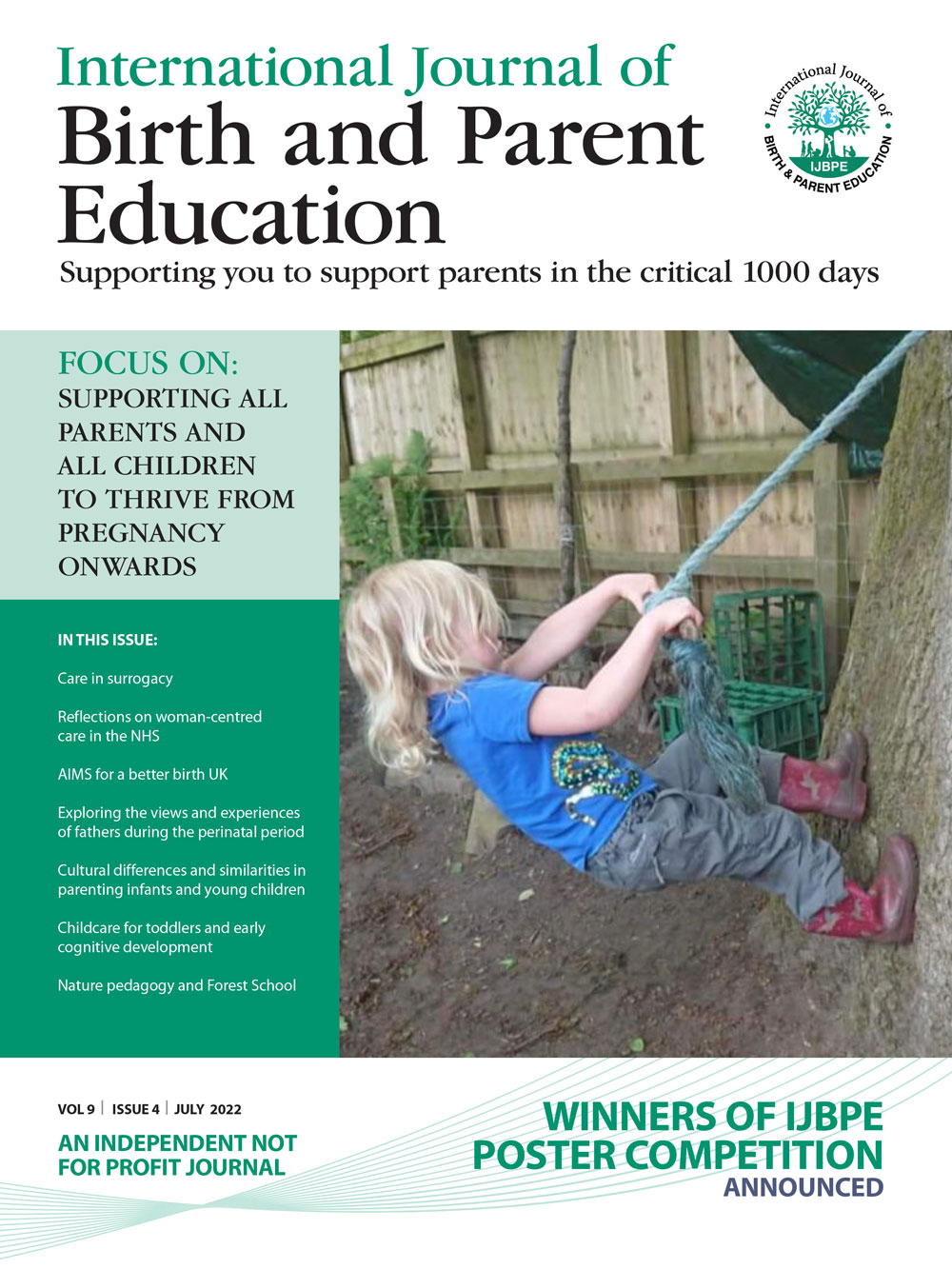Vol 9 Issue 4

FOCUS ON: SUPPORTING ALL PARENTS AND ALL CHILDREN TO THRIVE FROM PREGNANCY ONWARDS
IN THIS ISSUE:
- Care in surrogacy
- Reflections on woman-centred care in the NHS
- AIMS for a better birth UK
- Exploring the views and experiences of fathers during the perinatal period
- Cultural differences and similarities in parenting infants and young children
- Childcare for toddlers and early cognitive development
- Nature pedagogy and Forest School
Author: Fi Hennessy, Jessica Smart, Alan White
Author title: Fi Hennessy, Experienced Surrogate and Wellness Practitioner
Jessica Smart, Experienced Surrogate, former Midwife and Lecturer
Alan White, Intended Parent and Surrogacy UK Trustee
Description: SurrogacyUK is a non-profit organisation that advocates for and supports altruistic surrogacy in the UK. Since 2002, over 350 surrogate babies have been born to SurrogacyUK members. SurrogacyUK specifically supports people unable to carry their own children (with a broad definition) and those whowish to support them. The authors of this article are experienced surrogates and SurrogacyUK members. They here provide some straightforward and safe adaptations to professional practice in order to help improve experiences and outcomes for all parties involved in surrogacy.
Description writer: Fi Hennessy, Experienced Surrogate and Wellness Practitioner
Jessica Smart, Experienced Surrogate, former Midwife and Lecturer
Alan White, Intended Parent and Surrogacy UK Trustee
Author: Mavis Kirkham
Author title: Emeritus Professor of Midwifery at Sheffield Hallam University, UK
Description: In this article, Mavis Kirkham reflects on changes since she first worked in maternity care in the UK as a student midwife in 1971. She ceased clinical practice as a midwife in 2016, although still has many links with midwifery. Her analysis of the present state of midwifery and of midwifery care challenges all those who are committed to woman-centred care to step back and see what is happening to the trusting relationships that women and their families so urgently need as they prepare for and bring a new life into the world.
Description writer: Emeritus Professor of Midwifery at Sheffield Hallam University, UK
Author: Lester Coleman, Coleman Research and Evaluation Services
Description: This article reports on interviews with 50 fathers across Sussex (England), five mothers, and 10 health and social care professionals with the aim of generating support solutions for fathers. Although most fathers were jubilant about the pregnancy and birth, they also experienced a sense of trepidation in relation to their new responsibilities. During the first year, all fathers experienced challenges to different degrees. These included excessive tiredness, the demands and monotony of childcare, isolation from their partner and child, having less time with friends, and worsening mental health. The article concludes with recommendations regarding information-sharing, social support, and professional support for fathers across the transition to parenthood.
Author: Jennifer E. Lansford
Author title: This article describes cultural similarities and differences in parenting with examples focused on infancy and early childhood around the world. Parenting behaviors can be the same or different across cultures, and a given behavior can serve the same or different functions. However, parenting behaviors that protect children from harm and promote their survival and growth are found in all cultures. Parenting programs developed in one culture can sometimes be used successfully in another, as long as appropriate adaptations are made. When practitioners work with immigrant or refugee parents, understanding parents’ beliefs and behaviors stemming from both their country of origin and country of destination is important, as is recognizing strengths that parents bring to their role. Gender dynamics and the roles of extended families are also important considerations when working with culturally diverse families.
Description writer: Center for Child and Family Policy, Duke University, Durham, NC, USA
Author: Marina Robb & Jon Cree
Author title: Jon Cree – Eco-Educator
Description: Nature contact and connection, indeed immersion, at an early age is essential for health both as an infant and for the rest of a human life. There are physical health benefits such as building a resilient gut biome, getting off to a good start regarding sensory attunement, and good muscular development but, importantly, we now know that healthy relationships and attachments are more effectively facilitated through adult, child and natural world ‘bonding’. This article will expand on these benefits and explain some of the principles behind Nature Pedagogy, Forest Kindergarten, Forest School and ‘getting out’ into our natural habitat as soon as possible on a regular basis.
Author: Nina Drange
Author title: Post Doc
Description: Studies of children aged three years plus often, but not always, find that childcare has favourable effects on child development. One plausible explanation for this is that high quality childcare provides a stimulating environment in which children interact with other children and are cared for by trained pedagogical staff who facilitate age-appropriate activities. Children from less advantaged families may benefit more from childcare. This article describes a ‘natural experiment’ when a shortage of childcare spaces in Oslo led to children under the age of three being randomly allocated to a childcare space or not. Previous studies have examined the impact of early childcare on children over the age of three and findings may not be transferable to younger children. The findings from this study are therefore important for both practitioners and parents who are seeking to make the best decision regarding when to place their toddlers in childcare.
Description writer: Post Doc at the Frisch Centre, Oslo, and Research Fellow at Statistics Norway
